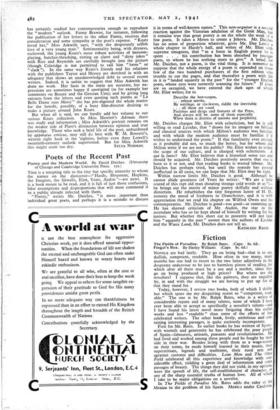Poets of the Recent Past
THIS is a tempting title to the tiny but specific minority to whom the names on the dustcover—" Hardy, Housman, Hopkins, the Imagists, the Sitwells, Eliot, Yeats, Auden "—are news. It is a book meant to be read, and it is full of just those confusions, false assumptions and disproportions that will most commend it to a public already infected with them. " Poetry," writes Mr. Daiches, " is more important than individual great poets, and perhaps it is a mistake to discuss
it in terms of well-known names." This non-sequitur is a natural reaction against the Victorian adulation of the Great Man, but it remains true that great poetry is on the whole the work of a few poets. It takes a Moses to create a Jehova. Mr. Daiches has no sense of proportion whatever, gives Mr. Day Lewis a whole chapter to Hardy's half, and writes of Mr. Eliot with supreme smugness, that " as a force in English poetry he is spent . . . his contribution has been absorbed by younger poets, to whom he has nothing more to give." A trend, for Mr. Daiches, not a poem, is the vital thing. It is nonsense to suppose that the whole energy of a poem is expended on those few of the two hundred purchasers of the first edition who trouble to cut the pages, and that thereafter a poem with life in it is " landed squarely in the past " for the " younger English poets, whose eyes were earnestly scanning the future." If poets are so occupied, we have entered the dark ages of which Mr. Eliot writes; for to
Describe the horoscopes, release omens, By sortilege, or tea-leaves, riddle the inevitable . . . all these are usual Pastimes and drugs and features of the Press, And always will be some of them especially When there is distress of nations and perplexity.
Mr. Daiches charges Mr. Eliot with eclecticism, but he is still willing to read Lycidas, that " draws for its imagery on biblical and classical sources with which Milton's audience was familiar, and with which the modern audience must be familiar if it wishes to understand the poem." If this familiarity ever existed, as it probably did not, so much the better, but for whom did Milton write if we are not his public? Mr. Eliot wishes to widen the scope of our culture, and is charged with eclecticism. A qui la faille? Mr. Eliot believes that a historical sense can and should be acquired. Mr. Daiches positively asserts that one is born to it or not, and that reading books is wasted labour. Mr. Daiches has perhaps tried, but until the remedy has proved ineffectual in all cases, we can hope that Mr. Eliot may be right. Within narrow limits Mr. Daiches is good. Although he cannot abide greatness (of Yeats he writes : " We are a little scared of this rapt old man shouting strange cold words at us ")- he brings out the merits of minor poetry skilfully and without distortion. He refurbishes the tiny forgotten lustre of H. D., restores the mood of freshness to Granchester, and it is with appreciation that we read his chapter on Wilfted Owen and his contemporaries. Mr. Daiches is good—too good—at summing up. He has shrewd criticism of Mr. Auden, the star in the ascendant who has so far kept ahead of himself by writing for his juniors. But whether this short cut to posterity will not land him " squarely in the past " sooner than the authors of Lycidas and the Waste Land, Mr. Daiches does not tell us.
KATHLEEN RAINE






























 Previous page
Previous page